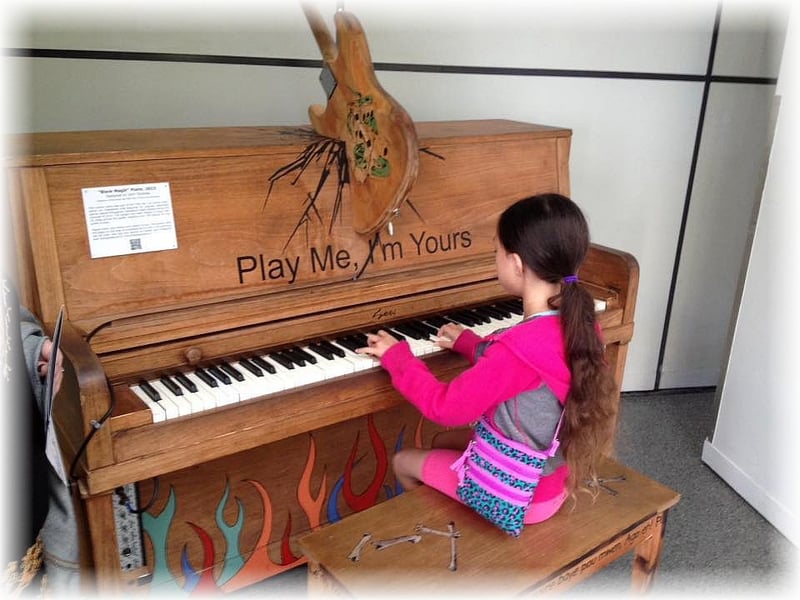Recently, I had the pleasure of attending my 10 year old daughter's first music recital. She started piano lessons quite some time ago. Her first piano teacher is still her choir director at church. But when it came time for that holiday recital, she was still too young and overwhelmed to play in front of a crowd. She did play for her second piano teacher, but it was a little more informal inside her piano teacher’s home. This time, she was definitely center stage in a church worship area on a Saturday afternoon.
As this was our first year with this new piano teacher, we heard some of the other students for the first time. High school wrestlers with powerful arms played exquisitely dainty passages of music. Smaller students still coaxed massive sound out of the instrument. There were interesting arrangements of pop songs, some of which were clearly more for the parents’ generation than the children’s. And there were plenty of pop songs that my daughter knew that I did not.
Recitals and Sacraments
We just completed the Easter Season and with it First Communion and Adult Confirmation Celebrations. Often, the emphasis for sacramental celebration is on correct knowledge and correct form. Information should be memorized and understood. There are actions to do, ways to move your body, places and things you need to know. The same could be said for preparing to master a piece of music. Yet at some point, one has to let go and let the celebration come together.
Often First Communions or Confirmation come with heavily orchestrated lists of instructions. Ushers, catechists, DREs, parents get heavily involved in marching the kids in and out of pews and around the church. At the piano recital, families simply sat where we were. Students were responsible for getting up at the appropriate time to approach the piano, make any adjustments necessary, and then play their pieces. The most instruction they received (minus all the lessons leading up to this), was to bow before sitting down and at the end of their performance, before returning to their seats.
Regardless of how the official piece of music was notated, what notes the teacher gave her students, how many hours the student did or did not practice, all of this vanished for a moment as they played their pieces. It was, as it should be, a real moment of transparency. There were mistakes as well as surprises. But at the end of the day, the recital happened. Nobody turned around to second-guess the process or wonder if there should have been better information to memorize or clearer instructions about what to do or say.
Music to my ears
Oh, how I wish religious education and sacramental preparation could be more like this than talked to death in various settings. I see my role during sacramental celebrations to be less like the helicopter parent, the concerned DRE, or the monitoring usher. I see it more like the piano teacher at the recital when she stood near the piano to assist students in turning pages of music.
She was not there to instruct, or to direct, or even to call attention to herself. In fact, to a certain extent, we in the Assembly saw her, but knew not to notice her. Her role was to aid the student in reaching that moment of transparency, where we saw them clearly and heard the music in that unique moment come together.
[Tweet "In sacraments each approaches the altar to become more who they are. @TribePlatypus"]
I know sacraments aren’t performances done for bows and applause. They are moments of transparency and less about training our children to fall into line or follow along like everyone else. Each approaches the altar to become more who they are. They come as they are and they are changed: the big kid with a soft side, the shy kid with an important message, the kid who knows the songs of our traditional past or the kid who lifts us up to new horizons.
I wish it could be that simple: Less about being nervous or afraid, less “correct instruction” or "knowing more" lest a soul should fall away from the Church. It should be more about the joy of celebrating transparency, where God is real and present to us, His Beloved children, in whom His Spirit gives voice.
Reflection
What events in your child’s life remind you of church activities? Do they help you live your faith more fully because they happened in the world, not just at church or during Religious Ed.?
Prayer
Dear God, I thank you for the gift of this child
Who helps me see the needs of your parish
Through the experiences of families outside the Church.
Copyright 2017 Jay Cuasay
About the Author
Jay Cuasay
Jay Cuasay is a freelance writer on religion, interfaith relations, and culture. A post-Vatican II Catholic father with a Jewish spouse, he is deeply influenced by Christian mysticism and Zen Buddhism. He was a regular columnist on Catholicism for examiner.com and a moderator and contributor to several groups on LinkedIn. His LTEs on film and Jewish Catholic relations have been published in America and Commonweal. Jay ministered to English and Spanish families at a Franciscan parish for 13 years. He can be reached at TribePlatypus.com.



.png?width=1806&height=731&name=CatholicMom_hcfm_logo1_pos_871c_2728c%20(002).png)
Comments